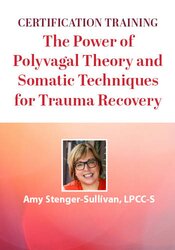

When working with clients with high levels of developmental and complex trauma, understanding the nuances of the human nervous system is no longer option – it’s essential.
Without this specialized knowledge, many clinicians find themselves able to address surface-level symptoms only, while clients continue to struggle with the fallout of trauma, including anxiety, depression, hopelessness, and obsessive thinking.
Too often, therapy feels stagnant, and a path toward healing remains elusive.
Watch Amy Stenger-Sullivan, MA, LPCC-S, somatic health expert, for this perspective-shifting course where you will learn to harness the power of polyvagal theory to:
Best of all, you’ll end this training with the education requirements you need to become a Certified Clinical Trauma Professional (CCTP). Professional and clinical experience standards apply.
Don’t miss this opportunity to elevate your clinical skills while guiding your clients toward resilience and healing. Purchase now.
CERTIFICATION MADE SIMPLE!
Attendees will receive documentation of CCTP certification from Evergreen Certifications 4 to 6 weeks following the program.
*Professional standards apply. Visit for professional requirements.
Planning Committee Disclosure - No relevant relationships
All members of the 小蝌蚪视频. planning committee have provided disclosures of financial relationships with ineligible organizations and any relevant non-financial relationships prior to planning content for this activity. None of the committee members had relevant financial relationships with ineligible companies or other potentially biasing relationships to disclose to learners. For speaker disclosures, please see the faculty biography.
Continuing education credit information is coming soon for this non-interactive self-study package.
CE hours may be available for select professions, as listed in the target audience. Hours will be dependent on the actual recording time. Please check with your state licensing board or organization for specific requirements.
There may be an additional fee for CE certificates. Please contact our Customer Service at 1-800-844-8260 for more details.
**Materials that are included in this course may include interventions and modalities that are beyond the authorized practice of your profession. As a licensed professional, you are responsible for reviewing the scope of practice, including activities that are defined in law as beyond the boundaries of practice in accordance with and in compliance with your professions standards.

Amy Stenger-Sullivan, MA, LPCC-S, is a Licensed Professional Clinical Counselor-Supervisor, Certified Trauma Specialist, EMDR Therapist, SoulCollage® facilitator, and founder of Rooted Compassion Counseling and Consulting, LLC. With over three decades of experience in bodywork and mental health, Amy leads a team of therapists who integrate the Polyvagal Theory (PVT) into trauma-informed care. Her work with the PVT began in 2005 and deeply shaped her personal and professional journey, eventually leading her to join Deb Dana’s team as senior trainer in 2021. Amy now delivers her own training series and is co-authoring a forthcoming book on the PVT and children’s therapy with Norton Publishing.
Drawing on her background in EMDR, somatic healing, and attachment science, Amy helps clients move toward emotional safety, post-traumatic growth, and resilience. She is widely known for her warm, humorous, and highly accessible teaching style, making complex material practical and transformative for clinicians across disciplines.
Speaker Disclosures:
Financial: Amy Stenger-Sullivan is the owner of Rooted Compassion Counseling and Consulting, LLC and has an employment relationship with Rhythm of Regulation. She receives a speaking honorarium from 小蝌蚪视频. She has no relevant financial relationships with ineligible organizations.
Non-financial: Amy Stenger-Sullivan is a member of the American Counseling Association, the Ohio Counseling Association, EMDRIA, and the Greater Cincinnati Counseling Association.
Access never expires for this product.
Visit our FAQ page at www.pesi.com/faq or contact us at www.pesi.com/info
Trauma and the Nervous System
Assess and Address Nervous System States
A Path Toward Healing: Polyvagal-Informed Intervention
Build Therapeutic Rapport via the Social Engagement System
Leverage the Nervous System to Build Resilience and Self-Regulation
From Theory to Practice
Satisfaction Guarantee
Your satisfaction is our goal and our guarantee. Concerns should be addressed to: PO Box 1000, Eau Claire, WI 54702-1000 or call 1-800-844-8260.
ADA Needs
We would be happy to accommodate your ADA needs; please call our Customer Service Department for more information at 1-800-844-8260.
小蝌蚪视频 Mobile App
Access CE trainings on your phone or tablet through our free mobile app. Choose video or audio-only versions of online courses from the world’s best instructors, and complete your CE requirements anywhere, anytime, at your own pace.
Please wait ...